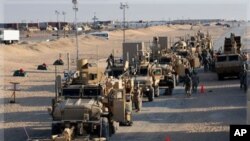After almost nine years of war, U.S. combat troops are no longer in Iraq. In this report, VOA Senior Correspondent Andre de Nesnera spoke with three former high-ranking U.S. government officials about challenges facing Iraq now that the U.S. is no longer there.
The last American soldier left Iraq last month, leaving behind a country that President Barack Obama described as “sovereign, stable and self-reliant.”
The U.S. withdrawal fulfills a promise made by President Obama. In addition, the pullout was a subject of debate, with Iraqi leaders wanting a U.S. contingent to stay in place. But the Iraqi government refused to grant these troops immunity from prosecution under Iraqi law, as requested by Washington.
Scene of violence
Since the U.S. withdrawal, Iraq has been facing an escalating political crisis and has been the scene of numerous bombings.
Nevertheless, Defense Secretary Leon Panetta, appearing on the CBS Face the Nation news program January 8, sounded a positive note, saying the United States is confident the Iraqi government and security forces are capable of dealing with security threats.
However, former Defense Secretary William Cohen disagrees. “I don’t think Iraq is capable, at this point, of defending itself from external threats or necessarily coping with those within. They don’t have the air defense systems," he said. "They don’t have the air assets. They don’t have the ground assets. They don’t have the counterintelligence capability that we supplied - so I think that it’s going to be a challenge for them.”
Cohen concedes that some U.S. troops will stay in the area. “We will redeploy some of our forces to other countries in the region - but it’s not the same as being on the spot and being able to come to their assistance at a moment’s notice,” he said.
Former National Security Adviser General Brent Scowcroft says U.S. troops should have stayed longer in Iraq.
“Because I think Iraq still has a difficult time getting itself together and making the compromises that are necessary to have a functioning system," he said. "Those compromises are probably easier to make in the embrace of a U.S. presence where they are likely to be willing to make adjustments. I’m afraid now that they are on their own, those adjustments might be harder to make. That’s what worries me.”
Key issues
General Scowcroft lists some of the key issues facing the Iraqi government.
“Compromises on how to handle oil income. What is the nature of the federalism of the system? How do you share power? Those are very difficult issues. And to make the necessary concessions - it’s easier when we were there,” he said.
Former U.S. Ambassador to the United Nations John Bolton sees another threat to Iraq. “The influence, the danger, the risk of subversion from Iran and the risk of a return on a very opportunistic basis by al-Qaida in Iraq, I think is substantial,” he said.
And, says Bolton, the U.S. withdrawal from Iraq is not a positive sign for the Arab countries in the Gulf.
“They see the U.S. pulling out and they worry about their own stability, right there in a dangerous neighborhood across the Gulf from Iran,” he said.
Experts say Iran’s suspected nuclear weapons program does not help foster regional stability. And along with an unstable Iraq, they say, it likely signals a long period of volatility.




